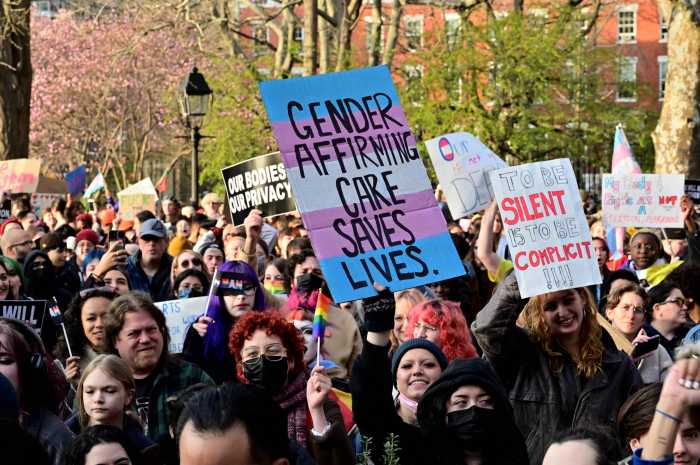Draconian crackdown on public discussions of homosexuality likely; Poland may follow suit
The Lithuanian Parliament on July 14 gave final approval to the most sweeping “No Promo Homo” law in Europe, a move hailed by conservative Polish parliamentarians, who immediately announced they would attempt to pass a similar law.
Entitled “Law on the Protection of Minors Against the Detrimental Effect of Public Information,” the measure bans public dissemination of information contributing to the “propagation of homosexual, bisexual, and polygamous relations” that might be available to minors. This ban encompasses mass media, books, and the Internet, and among the government agencies charged with enforcement are the Lithuanian Radio and Television Commission; the Lithuanian Ethics Commission of Journalists and Publishers; the government’s Information Society Development Committee, which supervises the Internet; and police authorities under the Ministry of the Interior.
In Poland, MP Artur Gorski, deputy head of the parliamentary commission on Polish-Lithuanian cooperation, told the Catholic Polish daily Nasz Dziennik that he intends to copy the Lithuanian law and introduce it for passage by the Polish Parliament. “This is a very interesting initiative and no doubt a very necessary one, especially now when we face a more and more obvious expansion of gay activist circles,” said Gorski, a member of the largest Polish parliamentary opposition party, Law and Justice — led by the ultra-homophobic Kaczynski twins, the country’s president Lech and his brother Jaroslaw, the former prime minister. Gorki also noted, “If you look at the Polish Parliament and see the ruling Civic Platform Party and the major opposition Law and Justice are both claiming to be right-wing, there should be no trouble in passing such a law.”
MP Leszek Deptu’a from the Peasant’s Party, a partner in Poland’s ruling parliamentary coalition, said, “This law is needed also in Poland,” adding, “We should protect kids and youth from homosexuality and from promoting this idea.”
The new Lithuanian law will provide a powerful legal weapon against attempts to have Gay Pride demonstrations or any media coverage of them. In the nation’s capital of Vilnius, after years of repression by the city’s former mayor, Juozas Imbrasas, who was thrown out of office in February, Vilius Navickas, his replacement, has offered no change of course, banning a scheduled Gay Pride march in the center city this year.
“These heavily homophobia-driven laws codify discrimination based on sexual orientation, deny freedom of expression, and inhibit LGBT persons’ rights to education, information, and every day life,” Lithuanian Gay League chair Vladimir Simonko said, adding that there was fear and even panic about what might transpire at next year’s Baltic Pride, due to be staged in Vilnius from May 7 to 9. The new law will take effect two months prior to that.
The draconian “No Promo Homo” legislation was originally passed last month, but vetoed by President Valdas Adamkus, who has since left office. When the bill went back to Parliament, Adamkus’ veto was overridden 87 to 6, and its anti-gay provisions were strengthened. Because of the veto override, the new president, Dalia Grybauskaite, who ran as an independent but was elected with support from the large Conservative Party, was obliged to sign it within three days. However, on her first foreign trip, to Stockholm, as she held a joint press conference with Swedish Prime Minister Fredrik Reinfeldt, who currently occupies the rotating presidency of the European Union, Grybauskaite expressed regret at having to sign the law. “But I will make use of the right I have to propose changes to the law to make it compatible with basic human rights,” she said, according to a press conference summary released by the office of the EU presidency.
Reinfeldt, the head of Sweden’s Moderate Party and leader of a center-right government, said he was opposed to such laws. “On a personal level, throughout my 20 years in politics, I have clearly shown where I stand on such issues,” he said. “I agree with Dalia Grybauskaite that it is important that a law such as this does not in any way contravene human rights.”
The right-wing Lithuanian MP who sponsored the law, Petras Grazulis, hailed passage of his bill, saying, “We have finally taken a step which will help Lithuania raise healthy and mentally sound generations unaffected by the rotten culture that is now overwhelming them.” Grazulis has also introduced a bill to recriminalize homosexuality, earlier prohibitions having been overturned in 1993.
Condemnations of Lithuania’s “No Promo Homo” law from all over Europe were swift in coming. Dainius Radzevicius, who chairs the Lithuanian Journalists Union, told the Associated Press, “This is absurd. I cannot even imagine how they will implement this law.” Dirk De Meirleir, executive director of the European Region of the International Lesbian and Gay Association, said passage of the new law was “a shocking and absurd development in one of the European Union member states. Just a few days ago even the Russian Federation’s Parliament rejected similar proposals.”
Amnesty International’s Kim Manning-Cooper warned that the law “could be used to prohibit any legitimate discussion of homosexuality, impede the work of human rights defenders, and further the stigmatization of and prejudice against lesbian, gay, bisexual and transgender people in Lithuania,” according to the BBC. “This is a very bad day for LGBT rights in Lithuania, and by adopting this deeply homophobic legislation, the Lithuanian authorities have taken a huge step backwards.” Manning-Cooper called the law “a clear infringement of freedom of expression and non-discrimination rights” and said it “should be repealed immediately.”
At a Parliamentary Assembly meeting of the European Union, held as news came of the Lithuanian law’s passage, 35 members from 18 different nations signed a declaration saying that it “will serve only to perpetuate discrimination and intolerance and deny young lesbian, gay, and bisexual persons access to information which they need in order to live in accordance with their sexual orientation.” The group called on the Lithuanian Parliament “to eliminate all discriminatory references to homosexual and bisexual relationships in this law.” The European Union’s Conference of International Non-Governmental Organizations passed a resolution denouncing the new law and saying it was “gravely concerned at a growing climate of intimidation and discrimination in Lithuania against lesbian, gay, bisexual, and transgender people.”
At the European Parliament in Strasbourg, the Parliamentary Intergroup on Lesbian, Gay, Bisexual, and Transgender Rights also attacked the new law and called on the EuroParliament’s new president, Jerzy Buzek, to express concern that the law violates the EU Treaty. The likelihood of Buzek doing so, however, is slim, since he is a member of Poland’s homophobic Law and Justice Party. The Intergroup’s chair, the UK’s openly gay Michael Cashman, speaking for its members, said in a press release, “This new law contradicts the values of the European Union where minority rights are and should remain respected. It is the duty of the president of the European Parliament to ensure that all minorities are treated equally.”
The law could also threaten education about HIV and AIDS, critics noted. “What were the lawmakers thinking when they passed this homophobic law?” said Boris Dittrich, advocacy director of the Lesbian, Gay, Bisexual, and Transgender Program at Human Rights Watch, adding, “Depriving young people of information they need to decide about their lives and protect their health is a regressive and dangerous move, and amounts to censorship.”
And the International Gay and Lesbian Human Rights Commission wrote to the Lithuanian Parliament, arguing that the “No Promo Homo” law “codifies discrimination based on sexual orientation, while also denying freedom of expression and inhibiting children’s rights to education, information, health, and life under international and European law.”


































